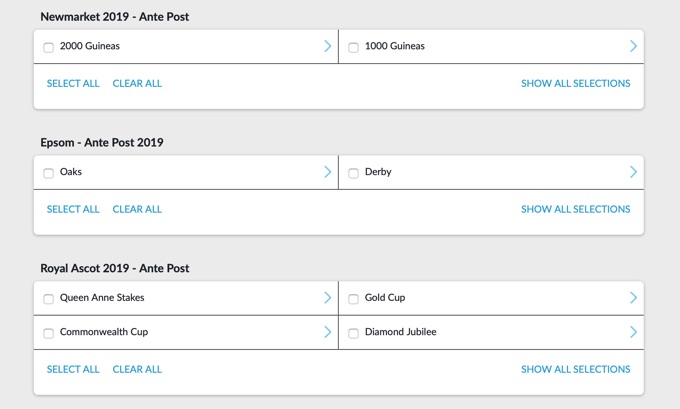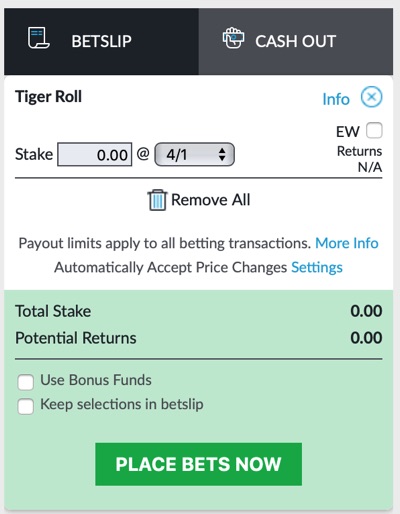 Casual bettors will look at horse races as they come along and decide to make a bet there and then. Some will look at the form of the horses participating whilst others will just go off something like their name or the colour of the jersey that the jockey is wearing. The more serious punters, however, will be looking at races well in advance and placing bets sometimes as much as a month or two ahead of the race.
Casual bettors will look at horse races as they come along and decide to make a bet there and then. Some will look at the form of the horses participating whilst others will just go off something like their name or the colour of the jersey that the jockey is wearing. The more serious punters, however, will be looking at races well in advance and placing bets sometimes as much as a month or two ahead of the race.
These are known as ante-post bets and they give people a chance to get maximum value from their wagers. Bookmakers usually offer longer odds on bets placed well ahead of an event, largely because there’s no guarantee that the horses bet on will actually take part in the race and so the bookies will make a return on a bet without ever worrying that it might end up being a loser for them. Here we’ll have a look at the world of ante-post betting, what it is and how you might want to try to take advantage of the system.
Ante-Post Bets Explained

Put simply, ante-post bets are wagers placed on an event ahead of time. An obvious example of what I’m talking about is to have a look at something not to do with horse racing: the Premier League. Let’s say you’re looking at the upcoming top-flight season during the summer, having weighed up the signings that clubs have made so far as well as how they did last time out. Even though it’s only July and the season doesn’t start until August, you decide to place a bet on Liverpool to win the league. You’ve just placed an ante-post bet.
Obviously, the difference between horse racing events and betting on the Premier League is that it’s extremely unlikely that Liverpool’s manager or owners are going to decide not to compete in the following season, whereas it’s entirely possible that a horse’s owner or trainer could do exactly that. Even so, the risk is still pretty much the same. Liverpool could sell their best players before the campaign gets underway, for example, reducing their chance of victory. Equally, the horse that you’ve bet on might pull a muscle or hurt itself during training, or it could just be run in a completely different race than the one you’ve bet on.
Ante-post is the name given to any bet that is placed before the runners are declared on the morning of the race. That usually takes place at around nine or ten in the morning for jump racing and up to forty-eight hours before in flat races, so whether you’re looking at a race the day before or six months before, you’ll be betting ante-post if you take the odds that you’re offered.
Betting Ante-Post
 Knowing what an ante-post bet is is one thing, placing an ante-post bet is something entirely different. The majority of those casual punters mentioned before will only really look at the ante-post market if they’re considering placing a bet on one of the biggest races of the season like the Grand National or the King George VI Stakes. They’ll perhaps look a day or two before the race is due to get underway, at which point the bookies will have large offers for the races plastered all over their site.
Knowing what an ante-post bet is is one thing, placing an ante-post bet is something entirely different. The majority of those casual punters mentioned before will only really look at the ante-post market if they’re considering placing a bet on one of the biggest races of the season like the Grand National or the King George VI Stakes. They’ll perhaps look a day or two before the race is due to get underway, at which point the bookies will have large offers for the races plastered all over their site.
If, however, you’re thinking of betting on a less famous race or want to bet much further in advance than a couple of days then you’ll need to know how to find the race you’re looking for. The vast majority of bookmakers offer search functions nowadays, which are perfect to use to find a specific event as you just type something like ‘Gold Cup’ into it and then make sure it takes you to the race you’re thinking of betting on. Another option comes in the form if ‘Upcoming Races’ or ‘Future Races’ tabs that bookies often place on their horse racing pages.
Once you’ve found the race that you’re looking to place a bet on, ante-post betting works just like any other form of wager placing. You make your selection, add it to your betting slip and choose how much you want to spend on the bet. It’s that simple.
Why It’s Worth Betting Ante-Post

Ante-post bets ultimately come down to the risk versus reward theory of life. Betting on anything well in advance if its taking place is a risky business, given just how tricky it is to make intelligent guesses about how things will pan out in the future. Horse racing is an industry that is particularly at risk of things changing at any moment, from horses not feeling well on the day to trainers or owners deciding that it would be better for them to enter a more prestigious race than the one you’ve bet on.
Bets Placed & Odds
Form matters in horse racing, too. Bookmakers will offer shorter odds on horses that have been running really well in the build-up to a race, so a bet placed ante-post will not have any of that information informing the odds. Equally, of course, a horse’s poor form won’t have been taken into account, so you might end up betting on shorter odds ante-post than if you’d waited for the day of the race. Perhaps a particular jockey has been riding well in recent times and has been selected to ride your chosen horse, reducing the odds by the time it comes to Starting Prices compared to when you placed your wager.
It’s worth bearing in mind that the sheer number of bets being placed can often influence the odds offered on a horse. If a nag has been made the favourite, say, then punters will often start betting on it heavily, meaning that bookmakers reduce the odds offered on it even lower in order to mitigate their losses. You, meanwhile, placed your bet a month ago when the odds were really long and are therefore sitting smug as the Starting Price comes in more and more.
Risk vs Reward
All of these things need to be taken into account when you’re thinking of betting ante-post. As I say, it’s the very definition of risk versus reward. The risk is that your horse doesn’t take part in the race and you simply lose the money for your bet without it ever running, or that the Starting Price odds are longer than the ones you got a month or two in advance. The reward is that you get much longer odds on a winning horse than most punters who waiting until the day of the race to place their bets.
Getting Your Ante-Post Timing Right
This is, in many ways, like the alchemy of betting. If you knew how to perfect the timing of your bets then you’d stop betting and just sell that skill, such is the extent to which any and every punter wants to know the answer to that too. Flat racing tends to be a favourite discipline for the ante-post bettor because the best races are won by horses at a much younger age. Have a look at the Classics, for example, and you can see races won by two, three or four-year-olds.
Finding the Right Horse
That means that you can figure out whether they are likely to be winners much earlier in the process than if you’re mainly betting on jump racing. In the jump world, horses can sometimes not win races until they’re seven, eight or even older. What you need to do is try to find horses that you like the look of before they become particularly well-known to the outside world. The less fancied a horse is the longer the odds on its success will be, which is the perfect time to strike.
All of that, of course, is much easier said than done. It takes a large amount of research and expertise and not everyone has the time or the inclination to bother. If you’re simply interested in getting slightly longer odds on your bet than you think you’ll get on the day then you can ignore all of this. In that instance the timing is just about waiting for the moment that the odds look to be at their longest and then pouncing, placing your bet in the full knowledge that the market might shift to make the odds longer than you’ve bet on them.
Perfecting the Timing
The final thing worth mentioning when it comes to timing is the fact that your money will be leaving your betting account the second you place the wager on an ante-post market. You might not know whether it’s a winner or even whether the horse is taking part in the race you’ve bet on for months, but you’ll be poorer in real terms the second you place the bet.
Is the offer you’ve received so good that it’s worth ‘losing’ that money ahead of time? Or would you be better off keeping it in your account so you can bet on other races and events? Getting the timing of your bet right is about much more than just the odds on offer.
Ante-Post Bets & Offers
 One thing some of you may be shouting at me whilst reading this is about Non-Runner, No Bet offers and that’s an entirely fair point. If you don’t know, NRNB, as bookmakers often write it, is an offer whereby you get your money back if your horse ends up being a non-runner.
One thing some of you may be shouting at me whilst reading this is about Non-Runner, No Bet offers and that’s an entirely fair point. If you don’t know, NRNB, as bookmakers often write it, is an offer whereby you get your money back if your horse ends up being a non-runner.
In other words, you can place your bet ante-post and get your money back if your horse is injured or ends up running in a different race. It’s the dream as far as most ante-post bettors are concerned, but it’s also not all that common an offer for any but the biggest races and so it can’t be depended upon.
NRNB Offer
If you’re betting on the Grand National and see a NRNB offer then that’s brilliant; my advice would be to get your bets in as soon as you can in case the bookie offering it changes their mind. If you’re looking to bet on a random race that’s due to take place in Leicester on a Friday afternoon, however, then I’d be amazed if you were offered Non-Runner, No Bet terms for it. Sometimes bookmakers refer to this offer as Non-Runner, Money Back, or NRMB, but it’s the same thing in principle: in races where it’s offered, you’ll get your money back if the horse you’ve bet on isn’t going to take part in the race once decelerations are made.
Cash Out Offer
Another offer that you might think to take is Cash Out. Let’s say that you’ve placed an ante-post bet on the King George VI Stakes, the bookie you’ve bet with allows you Cash Out ante-post beta and your selection has had a terrible season. In that instance, you might consider cutting your losses and getting your stake back.
The problem you might find is that you can’t Cash Out for the full amount. Perhaps the bookmaker is offering you £45 back on a £50 stake, say. Is it worth losing the fiver rather than just letting your bet take its course? That’s the sort of thing you’ll have to think about before clicking the Cash Out button.
